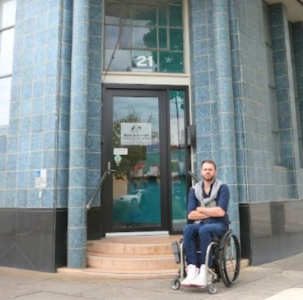When you can't even ring the doorbell to get into a government building, you know there's a serious problem with accessibility planning.
Australia's Health and Disability Minister Mark Butler has found himself in the spotlight over concerns that some government facilities may not be meeting basic accessibility standards that many of us take for granted.
Mark Butler serves as both Minister for Health and Ageing and Minister for Disability and the National Disability Insurance Scheme (NDIS), making accessibility issues squarely within his wheelhouse.
The dual role puts him at the centre of ensuring Australia's 4.4 million people with disability can access the services they need without unnecessary barriers.
The accessibility challenge facing Australia
The issue highlights a broader problem across Australia where the NDIS has grown incredibly fast and created new markets, which have impacted and distorted other parts of the health and social care ecosystem. But while services expand, basic infrastructure accessibility sometimes lags behind.
For many Australians over 60, accessibility isn't just about wheelchairs—it encompasses everything from hearing loops for hearing aids to clear signage for those with vision impairments, and yes, even something as basic as a functioning doorbell that people can actually reach and use.
Your accessibility rights in Australia
- All new public buildings must comply with Disability Discrimination Act standards
- Government facilities should provide equal access regardless of ability
- You can make complaints through the Australian Human Rights Commission
- Many accessibility features benefit everyone, not just people with disability
Butler's challenging portfolio
The minister's plate is certainly full. Recent media appearances show Butler addressing fraud in the NDIS, with the National Audit Office concluding that prior to 2024, the NDIS lacked basic prevention controls for fraud and non-compliance, with Australians rightly appalled by stories about fraudsters ripping off taxpayers and people with disability.
But while tackling fraud is crucial, advocates argue that basic accessibility compliance shouldn't take a back seat. After all, what's the point of having comprehensive disability services if people can't even get through the front door of government buildings?
The minister has been transparent about the challenges facing the disability sector. He acknowledges that while the NDIS job isn't done, the scheme is entering its adolescence—a period involving the maturing of services, but also full of risks that things will run off the rails without supervision and management.
What This Means For You
Many accessibility improvements benefit everyone. Ramps help not just wheelchair users but people with walking frames, mobility scooters, and parents with prams. Clear signage helps those with vision problems navigate more easily. Proper doorbells and entry systems ensure everyone can access services independently, maintaining dignity and autonomy.
The Australian Human Rights Commission reports that accessibility complaints often come from older Australians who've developed mobility, vision, or hearing challenges later in life. These aren't just 'nice to have' features—they're legal requirements under federal legislation.
For the over-60s, accessibility barriers can mean the difference between independence and dependence, between accessing services directly or needing to rely on others for help.
Recent policy developments
Butler's recent focus on investing more than $500 million to build NDIS capacity and launching more than 600 investigations into suspected fraud [5] shows the government is taking disability services seriously from a financial integrity perspective.
However, disability advocates argue that while preventing fraud is essential, ensuring basic accessibility compliance is equally crucial. After all, the most honest disability service in the world is useless if people can't physically access it.
'The scheme is entering its adolescence—a period full of risks that things will run off the rails without supervision and management.'
Looking ahead
Butler has acknowledged that more needs to be done to protect the NDIS and the people who rely on it, requiring much more robust market stewardship, including a well-calibrated system of provider registration. But advocates suggest this market stewardship should extend to basic accessibility compliance for all facilities receiving government funding.
The minister faces the complex task of balancing fraud prevention, service expansion, and basic accessibility compliance across a sector that touches millions of Australians.
For those over 60, many of whom may develop accessibility needs as they age, getting this balance right isn't just good policy—it's essential for maintaining independence and dignity.
Know your accessibility rights
- Document the problem with photos if possible
- Contact the facility manager first
- File a complaint with the Australian Human Rights Commission if needed
- Contact your local federal MP's office for assistance
If you encounter accessibility barriers at government facilities:
Remember: accessibility is a legal requirement, not a favour.
As Australia continues to grapple with an ageing population and growing awareness of disability rights, ensuring basic accessibility compliance isn't just about following the law—it's about creating an inclusive society where everyone can participate fully, regardless of their physical capabilities.
Have you encountered accessibility barriers when trying to access government services? We'd love to hear your experiences and any tips you have for navigating these challenges. Share your story in the comments below.
Primary source
The Hon Mark Butler MP | Health, Disability and Ageing Ministers | Australian Government Department of Health, Disability and Ageing
Cited text: 'The Hon Mark Butler MP Minister for Health and Ageing Minister for Disability and the National Disability Insurance Scheme · Mark Butler has been the ...'
Excerpt: 'Mark Butler serves as both Minister for Health and Ageing and Minister for Disability and the National Disability Insurance Scheme.'
Speech from Minister Butler, National Press Club – 20 August 2025 | Health, Disability and Ageing Ministers | Australian Government Department of Health, Disability and Ageing
Cited text: 'The NDIS has grown incredibly fast – and well beyond projections. It has created new markets – which have, in turn, impacted and distorted other parts...'
Excerpt: 'The NDIS has grown incredibly fast and created new markets, which have impacted and distorted other parts of the health and social care ecosystem.'
Speech from Minister Butler, National Press Club – 20 August 2025 | Health, Disability and Ageing Ministers | Australian Government Department of Health, Disability and Ageing
Cited text: 'In a recent report, the National Audit Office concluded that, 'prior to 2024, the NDIS lacked basic prevention controls for fraud and non-compliance'...'
Excerpt: 'Butler addressing fraud in the NDIS, with the National Audit Office concluding that prior to 2024, the NDIS lacked basic prevention controls for fraud and non-compliance, with Australians rightly appalled by stories about fraudsters…'
Speech from Minister Butler, National Press Club – 20 August 2025 | Health, Disability and Ageing Ministers | Australian Government Department of Health, Disability and Ageing
Cited text: 'But the job isn’t done. The scheme is now entering its adolescence – a period, as all parents know, that involves the maturing of our beautiful childr...'
Excerpt: 'He acknowledges that while the NDIS job isn't done, the scheme is entering its adolescence—a period involving the maturing of services, but also full of risks that things will run off the rails without supervision and management.'
Speech from Minister Butler, National Press Club – 20 August 2025 | Health, Disability and Ageing Ministers | Australian Government Department of Health, Disability and Ageing
Cited text: 'Our government has taken fraud seriously, investing more than $500 million to build the capacity of the NDIA to identify high-risk claims and prevent ...'
Excerpt: 'Investing more than $500 million to build NDIA capacity and launching more than 600 investigations into suspected fraud.'
Speech from Minister Butler, National Press Club – 20 August 2025 | Health, Disability and Ageing Ministers | Australian Government Department of Health, Disability and Ageing
Cited text: 'While our efforts are bearing fruit, more needs to be done to protect the NDIS and the people who rely on it. And that work will require much more rob...'
Excerpt: 'Butler has acknowledged that more needs to be done to protect the NDIS and the people who rely on it, requiring much more robust market stewardship, including a well-calibrated system of provider registration.'








